For the most part, cinema is a form of entertainment. But this is not to say that films cannot and should not concern themselves with some of the more serious aspects of life. It doesn’t get much more serious than existentialism. And an existential film, whilst often tricky to define, can be one of the most powerful ways to get an audience to muse on themes of life, death and existence.
So how do you begin to filter such a complex idea as existentialism through a screenplay? And what does existentialism in cinema even look like? In this article, we’ll seek to answer these questions. Whilst existentialism may leave you pondering the meaning of life, this article won’t leave you pondering the meaning of existentialist cinema.
Table of Contents
What is Existentialism?
As a philosophy, existentialism questions what it means to be a human being, and what it means to live and die. In a world in which ‘God is dead’, existentialism grapples with the disturbing possibility that we may simply be a bundle of flesh existing on a large rock that floats through a desolate universe.
“a chiefly 20th-century philosophical movement embracing diverse doctrines but centering on analysis of individual existence in an unfathomable universe and the plight of the individual who must assume ultimate responsibility for acts of free will without any certain knowledge of what is right or wrong or good or bad.”
Merriam-Webster
In this way, existentialism entails a search for the meaning of life in a world that increasingly seems devoid of meaning itself. It focuses on the individual in this search, which is one of the reasons it can lend itself well to existential films, despite its lofty and complex premise.
Why Does Existentialism Matter?
As will become clear, most existential thinkers argue that the meaning of life is intimately connected to your own subjectivity. In other words, only you can ascertain life’s meaning. It is a call for self-reflection and expression.
In fact, broadly speaking, existentialism demands the rejection of all exterior structures of meaning, the Church and the State providing just two examples. It places the burden of ‘meaning’ directly onto the individual, forcing them to reckon with and take responsibility for the decisions they make and, subsequently, the trajectory of their life.
The first half of the twentieth century saw two world wars resulting in the deaths of millions of men and women. The second half was dominated by a Cold War in which the threat of nuclear armageddon loomed perpetually. In the face of such death and destruction, existentialism arguably provided a road out of such darkness. It was a reclamation of life, a way of transcending the pitiful state of humanity.
Existentialism and Cinema
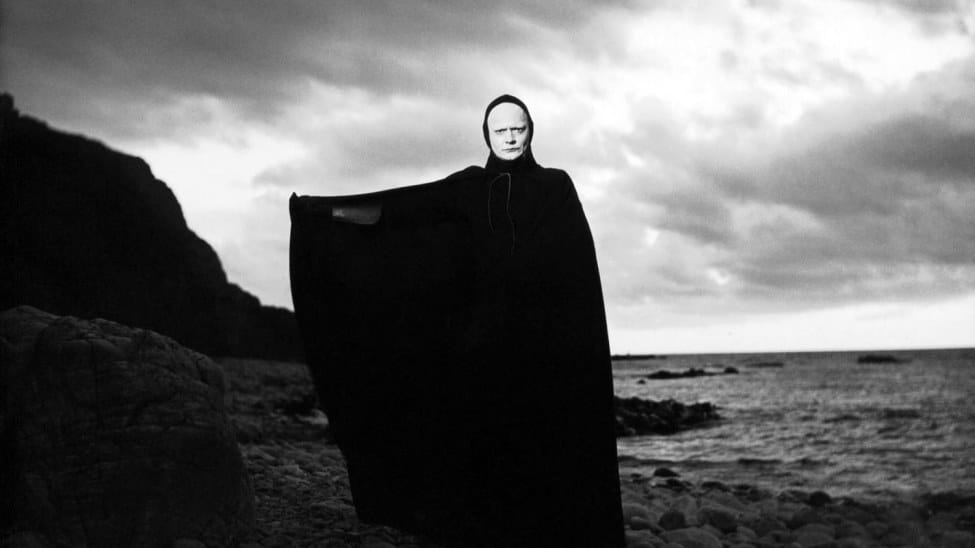
But how is all this relevant to cinema? Well, films are a great medium for the expression of and reflection on these philosophical teachings. The focus on the individual’s experience of such theories and concepts allows for the realization of them via visual internal conflict, for instance. Film, after all, is one of the best mediums for getting into a character’s head.
Philosophy is, for the most part, an inaccessible realm. However much we may be in need of spiritual guidance, it’s not easy to turn to the work of Nietzsche or Sartre. The sheer complexity of their writing often obscures its meaning. But existential films provide ample opportunity for the translation of such ideas into something more widely relatable.
Furthermore, existentialism holds emotion in high regard. In fact, its central contention is that human existence must be explored from an emotional rather than a purely rational perspective. This is probably why many existential thinkers chose to express their ideas in narrative form. For example, Sartre wrote Nausea and Dostoevsky wrote Notes from the Underground – both first-person narrative stories.
So, when pondering the subject of your next screenplay, existentialism may be a solid guiding premise. What is to come in this article will explore some of existential cinema’s shining examples and, in doing so, provide some useful pointers for your own writing of an existential film.
The Key Components of Existentialism
Firstly, it’s useful to break down existentialism into tangible components. Existentialism begins with the assertion that human beings are much more than their rational capacities. It regards humans as complex entities and seeks to rediscover the illogical elements of consciousness.
Unlike rationalism, existentialism contends that the deeper truths of human existence can be discovered only by examining the emotional and subjective aspects of the individual.
Alienation
Most existential thinkers agree that the West’s glorification of rationality amounted to a society of one-sided beings. Furthermore, they posited that the prioritization of ‘general truths’ created a gap between the human being and their true existence.
- In other words, by focusing solely on reason, we lost touch with who we truly are.
- This, according to existentialism, leads to feelings of fragmentation and alienation.
- Our ever-growing reliance on technology exacerbates this. It is a distraction that takes us further and further away from our own inner world.
Alienation, therefore, is a key component of existentialist thought. And this is quite an easy facet to apply to an existential film, alienating the character(s) from the world around them.
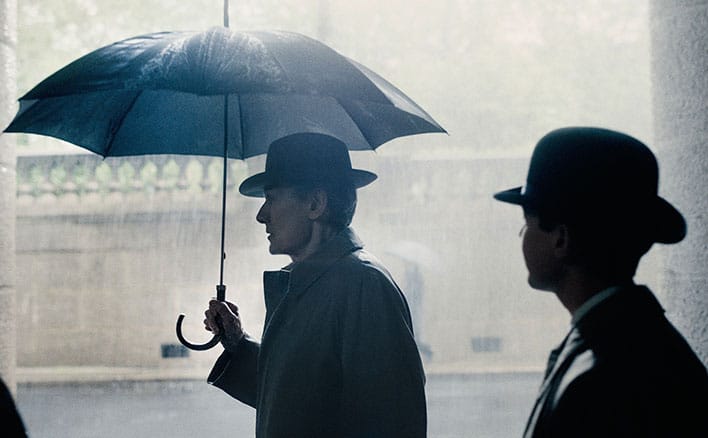
Angst
For existentialists, the question – ‘what does it mean to be a human being’ – can be answered only by exploring the individual and their unique experience. Broadly speaking, however, humans are defined as independent, responsible, and perishable beings that exist in a world unknown to them.
- Unlike other animals on this planet, who need no explanation for their purpose, humanity is not satisfied solely by its instinctive drives. It seeks out some deeper meaning or higher purpose.
- In this way, simply existing as a human is a source of anxiety due to the endless expanse of unanswered questions.
Who am I? Why am I here? According to existentialism, these thoughts capture what it means to be human. Ultimately, however, humans cannot know the meaning of their being, nor can they be sure that it has any meaning in the first place.
In fact, in view of the sheer scale of the universe, the ceaseless flow of time, and our incredibly transient existence, humanity appears utterly inconsequential. This awareness is termed: ‘soul-dread’. It is a reckoning that, no matter how much value we attribute to our lives, we will inevitably die and be forgotten. Cheery right?
So what’s the point of existentialism? So far it all seems pretty nihilistic, which isn’t a very useful modus operandi for life or indeed for a film. Well don’t worry, it does get (a little) less depressing. The following section will explore the solutions that existential philosophers propose for such feelings of angst and soul-dread and how they have been interpreted by filmmakers.
This, in turn, illustrates how a relatively abstract concept such as existentialism can be made into something more practical and tangible – something that the audience can relate to and identify with.
The Best of Existential Cinema
Let’s look at four existential films to see how existentialism can be filtered into a film in an accessible, engaging and powerful way.
To Live (Ikiru)
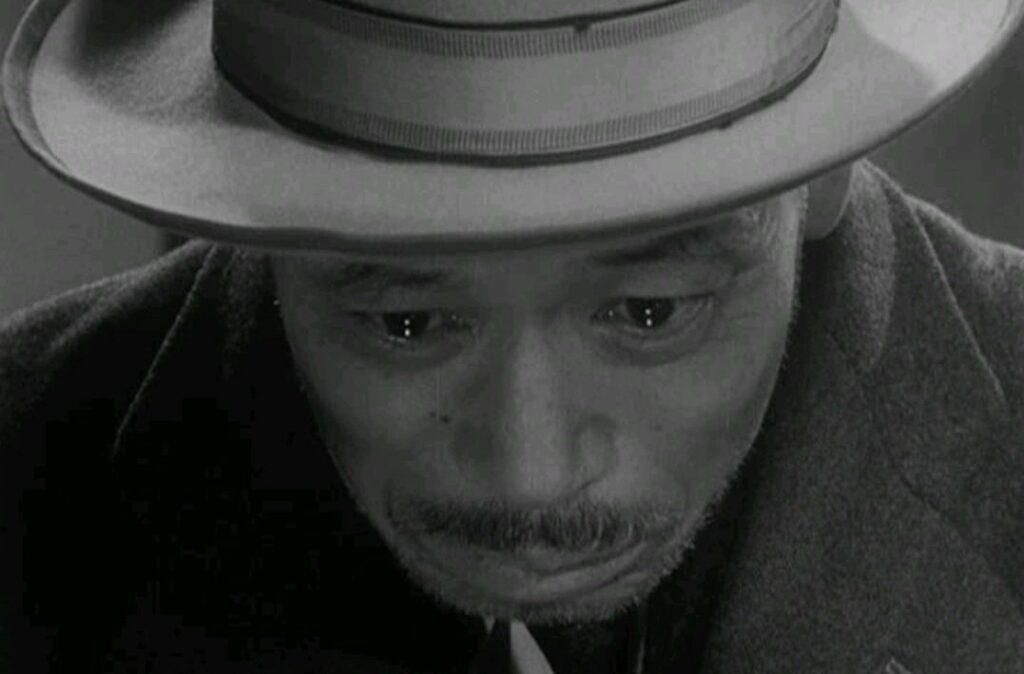
Kurosawa’s masterpiece, To Live (1952), is a perfect example of an existential crisis. This film also has a recent English-language adaptation, Living (2022).
- The film begins with its protagonist, Kanji Watanabe, being told by doctors he has six months to live.
- Facing imminent death Kanji is seized by panic. What has his life amounted to? Has he achieved anything of significance? Will he simply die and be forgotten?
- The harsh truth is that Kanji has spent the past twenty-five years in a perpetual state of numbness. Simply trudging from one day to the next, he failed to take responsibility for the course of his life, choosing instead the path of least resistance.
With just six more months left on Earth, Kanji withdraws his entire life savings and begins a voyage in search of meaning.
- He first meets Noguchi, a writer of cheap detective novels. After explaining his situation, Noguchi takes him on a wild night filled with alcohol, dazzling lights and dance floors. It ends with Kanji vomiting blood in the street.
- Clearly, this is not the solace he is searching for. The following day Kanji meets a young woman, Toyo, who works in his office. Drawn to her vibrancy, Toyo becomes his route to salvation. Yet, she quickly grows weary of him.
- After convincing her to meet him one last time, Kanji asks where she gets her life force from. She tells him that she finds happiness in making toys for children. Experiencing a revelation, Kanji rushes out of the coffee shop.
In the next scene, we see Kanji at work searching for a neglected petition requesting that a treacherous sump be turned into a children’s playground. This becomes his purpose. Kanji resolves that, before his time is up, he will see this project through.
Finding To Live‘s Meaning
We might approach the meaning of Kurosawa’s existential film from the perspective of Albert Camus. His notions of the ‘absurd’ refers to the contradiction between the human desire for meaning and the inherent meaningless and irrationality of the universe.
Facing this fact, Camus argues, is agonizing. He proposes three potential solutions for such agony. One is suicide; the second is nihilism. Both, however, are fruitless. Camus’s third option entails simply accepting existence as it is. Life, he believes, is better if it has no meaning.
- In the film, Kanji does not overcome the meaninglessness of his existence. His triumph is that he learns to accept this void.
- Kanji lives long enough to see the playground completed. However, he recognizes that, like his own life, it too will have no lasting effect.
- In Kanji’s final moments, he sits on a bench in the playground peacefully singing the song ‘Life is Short’.
Kurosawa’s message is that every ounce of significance we endow our life with will be extinguished upon our death. The present moment can be the only certainty. Thus, rather than living for a legacy, we must live for our passions. Only then will we find peace.
The Seventh Seal
The Seventh Seal (1957) is an existential film set in the 1300s during the outbreak of the Black Death. The story centers around Antonius Block, a disillusioned knight returning to his castle after a long crusade. Like Kanji in To Live, Block is filled with existential angst. Haunted by the atrocities of war, he struggles to understand the meaning of life.
Confronting a world filled with misery, Block questions the existence of God. How could anything benevolent have created such a woeful world? Yet if only nothingness awaits him, death for Block would be an intolerable horror. Ultimately, Block cannot come to terms with the fact that death and destruction is all life might amount to.
Like To Live, The Seventh Seal is also grounded in the existential theme of death. Whilst the former forces the audiences to confront the inevitability of death by centering the narrative around a terminally ill man, Bergman’s The Seventh Seal includes the character of Death itself.
- At the start of the film, Block is confronted by Death, who informs him that he’s come to take his life.
- Hoping to postpone his ‘doom-day’ in order to see his wife one last time, Block challenges Death to a game of chess.
- Death promises that he’ll let Block live for as long as the game continues.
It is on the journey home to see his wife that Block discovers the meaning of his existence. Jof, a traveling performer, sees Block playing chess alone. Sensing danger he quickly gathers his family and flees. Noticing this over Death’s shoulder, Block tips over the chessboard in an attempt to buy them some time. In doing so, Block yields to Death and accepts his fate. In essence, he sacrifices himself to save Jof, his wife, and child.
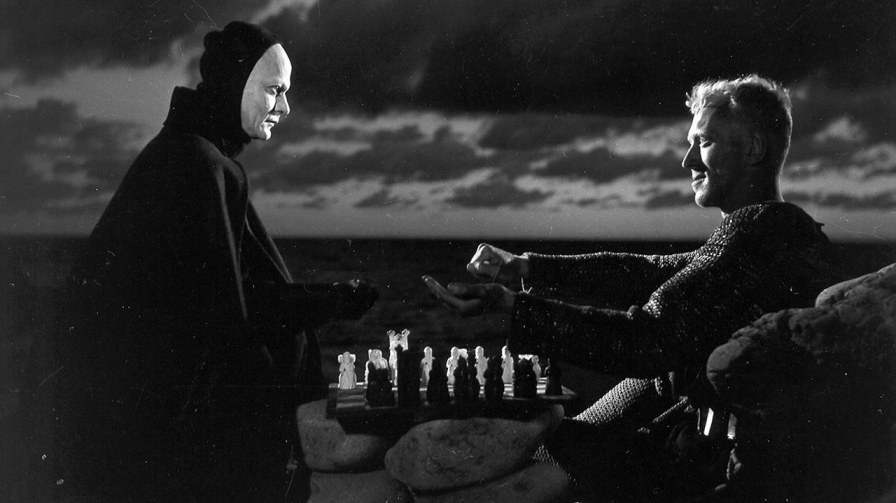
The Choices We Make
It is important to note that existentialism is not a cohesive theory. The arguments of its various exponents differ substantially, often in the solutions they offer.
To Live and The Seventh Seal are similar in that both their protagonists grapple with an existential crisis. Yet Bergman’s conclusion is not the same as Kurosawa’s. Whilst To Live seems to abide by Camus’s belief that humans must come to terms with the inherent meaninglessness of life, The Seventh Seal appears more closely aligned with the work of Sartre.
- Sartre believed that humans can make their own meaning. To him, consciousness is a blank canvas that lies at the core of human existence.
- This, he argues, is the basis for human freedom.
- It means that, unlike other animals, humans are not tied to any imperative. We are autonomous beings who construct own our fate.
The meaning of life, therefore, does not stem from God. Rather, meaning is forged through our actions and choices.
This closely aligns with The Seventh Seal’s denouement. Block seems to recognize that, whether there is a God or not, the meaning of his existence must be grounded in the life he chooses to lead. By forfeiting the chess game and saving Jof’s family, Block makes his life meaningful by choosing to confront death with courage and dignity.
The Truman Show

The Truman Show (1998) can also be interpreted from a Sartrean perspective in that it expresses a strong commitment to the individual’s capacity for self-determination.
- This existential film centers around Truman Burbank who has spent his entire life in the fictional town of Seahaven.
- Unbeknownst to him, Truman is actually the star of a reality TV show. His friends and family are all actors being paid to create the illusion of a real town.
- As the film progresses, Truman encounters a number of strange occurrences. A spotlight, for example, falls from the sky. He also hears voices through his car radio detailing his progress to work.
- In light of these events, Truman begins to question the reality of his situation.
In this sense, the film is an account of an ‘existential awakening’ from a life of unthinking conformity to a recognition of one’s capacity for self-determination.
Truman comes to realize that he has been playing a role, that his entire existence is a fabrication. Consequently, his life lacks meaning because it does not derive from him. True it may be a comfortable life, but Truman’s desire to escape it expresses Sartre’s belief that meaning must originate from an individual’s personal choices. In other words, only you can establish the meaning of your existence.
The Wider Applicability of the Film
The Truman Show‘s wider applicability can be interpreted from a number of different perspectives.
- Christof, for example, the executive producer of the reality TV show, has been likened to God due to his seemingly omniscient presence.
- The film is also seen as a critique of the way in which the media twists and distorts reality.
Whatever angle you approach it from, the Truman Show echoes Sartre’s call to live life ‘authentically’. Doing so requires subjective isolation. This entails the rejection of all attempts to subordinate individuals to external determination, authority, and coercion.
Ultimately, therefore, living an authentic existence means not blindly relying on a higher authority (such as God or the Law) to guide one’s outlook or the decisions one makes. For Truman, this means breaking free from the artificial construction that is his life.
Lost in Translation
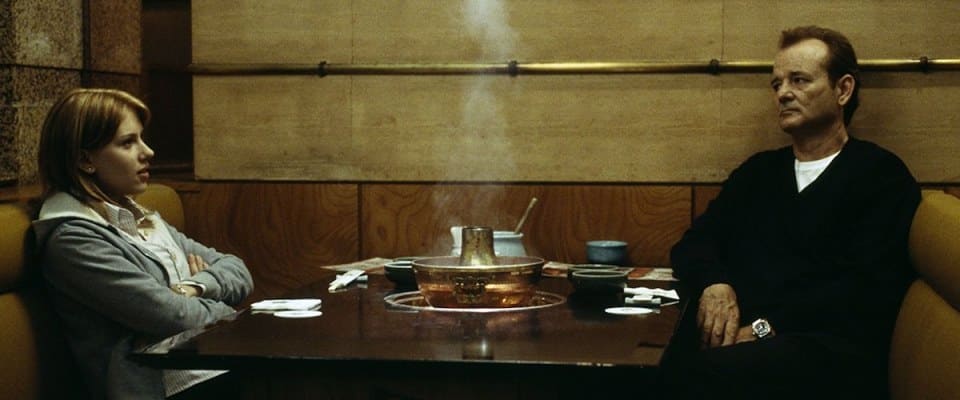
Sofia Coppola’s Lost in Translation (2003) centers around two characters.
- Bob Harris is a middle-aged American actor who is shooting a whisky commercial in Tokyo.
- Charlotte, on the other hand, is a young woman who has recently graduated from university with a degree in philosophy. She is traveling with her husband who works as a photographer.
- Bob and Charlotte are staying in the same hotel and meet because neither can sleep.
Throughout the film, a relationship of sorts develops between them. They bond over the shared experience of being at a crossroads in life. Bob is in an unhappy marriage and doesn’t know what to do about it, whilst Charlotte cannot decide what path to take herself on.
We Decide Who We Are
Sartre’s ideas also seem to form the bedrock of Coppola’s film. In rejecting the notion of some transcendental human nature, Sartre claims that it is we, ourselves, who must decide who we are to be. The journey that Charlotte goes on is guided by this principle.
- For example, in one scene she calls her friend back home to ask for some advice. She wants to know why she felt nothing when listening to monks in a temple chanting.
- Her friend, however, cuts the conversation short because she is preoccupied.
- Through this, Coppola reinforces the fact that Charlotte cannot ascertain the meaning of her existence through any third party; she herself must decide why she felt nothing and how to act off such a feeling.
Another Sartrean concept present in Lost in Translation is the idea that ‘reality exists only in action’. In other words, only by doing things can we begin to understand who we truly are.
- Charlotte is so concerned with contemplating what her life means that she’s forgotten to live it.
- Yet, as Sartre expressed, ‘life is nothing until it is lived’.
- Ultimately, through conversations with Bob, Charlotte comes to realize that she is the life she leads, that is, the actions she engages in.
In this sense, Lost in Translation arrives at the same conclusion as The Seventh Seal: that the meaning of life is not an objective truth. Meaning derives from action, from the choices that we make.
Thus, living a meaningful life is not contingent on how successful we’ve been. Bob, for example, has achieved a great deal in his career but still feels his life lacks purpose. Rather, living a meaningful life is about the way in which we face up to the unknown and uncertain and choose to act regardless.
Writing Your Own Existential Film
So, what can we take away from this study of four existential films? How might you approach writing your own existential screenplay?
There are a number of common threads running through all four films, and countless others that may be identified. However, let’s look at the four key building blocks that will help you start.
1. The Individual
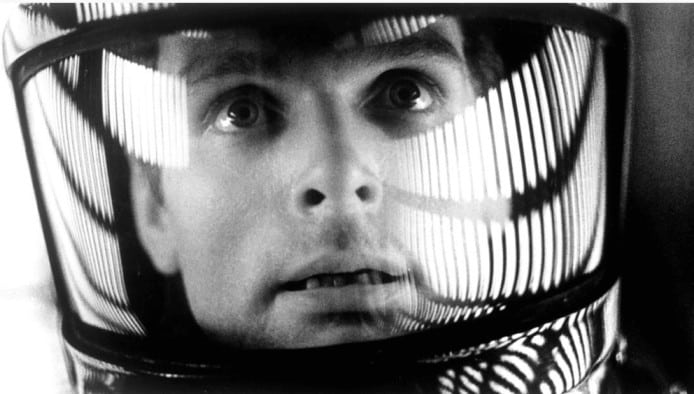
All four of these existential films explore the human condition, that is, what it means to exist as a conscious being. They undertake this study by examining the subjective experiences and beliefs of ‘the individual’.
This is crucial, and something your screenplay must abide by, since the meaning of life, according to existentialists, is an intimate and personal quest that we must all venture on.
Find your relevant protagonist and lean into their journey and internal conflict. It’s through this that existentialism can be tangibly achieved. We might not hear the questions and thoughts that go through their head (although this is an option via voiceover narration). But we become intimate with their internal machinations through visuals, detailed characterisation, and nuanced action.
2. Psyche
These subjective experiences and beliefs, from an existentialist perspective, can be characterised by:
- Angst: a feeling of deep anxiety and dread that arises from the awareness of one’s own mortality and the uncertainty of existence.
- Despair: a sense of hopelessness that results from the unsettling possibility that life has no inherent meaning.
- Alienation: a feeling of isolation or disconnection from oneself, others, or the world. It arises from the recognition that one’s views and perspectives do not align with those around them.
Taken together, such experiences and beliefs amount to an ‘existential crisis’. This is another central tenet that your screenplay needs to include. Essentially, your protagonist must embody this psyche in some way, either at the start of or during their journey.
3. Breaking Free
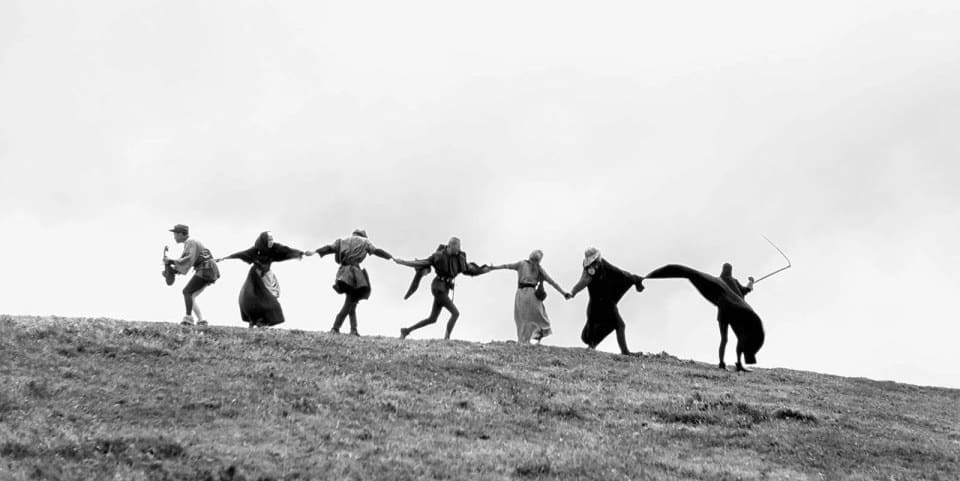
Whilst the protagonists in all four films are consumed by ‘soul-dread’, they are equally driven by a desire to break free from such constraints. In others words, by a conscious or sub-conscious faith that somewhere some meaning must exist.
Ultimately, in order for your screenplay to reach a judgment on the meaning of life, your characters must seek it out. This will be the film’s arc; the attempt to break free of whatever constraint is on them.
This constraint might be physical or literal, as it is in The Truman Show. However, mostly it must be a mental constraint. The character must break free from the limits in their mind, reaching a higher existential ground than what their every day contains them to.
4. A Conclusion/Change
All four films arrive at a similar sort of conclusion: that the meaning of existence is a personal endeavor. In other words, life is what you make it, and the meaning of life is defined by your choices and actions.
In true existentialist fashion, however, only you and your protagonist can find the film’s denouement. And this is why, despite its complexity, existentialism can lend itself well to cinema. The protagonist is driven to make some kind of choice and action in the face of their existentialist crisis. This, in turn, drives an engaging narrative.
All good stories, after all, are about the protagonist going on some kind of revelatory journey and coming out the other side with a new perspective based on the things they have experienced and the action they have taken.
So as much as your story will be about your protagonist pondering their existence, it’s important to have an idea of where they land at the end of this journey before you start writing. Do they have a newfound appreciation of life? Or are they finally asserting control over their life?
Either way, your character’s journey must have purpose and a concrete, tangible end destination. This is a guardrail against your existential film becoming too ponderous and abstract. It’s a way of, instead, plunging the audience into your character’s mind and perhaps prompting their own existentialist revival.
– What did you think of this article? Share It, Like It, give it a rating, and let us know your thoughts in the comments box further down…
– Struggling with a script or book? Story analysis is what we do, all day, every day… check out our range of script coverage services for writers & filmmakers.
This article was written by Theo Collins and edited by IS Staff.
Get *ALL* our FREE Resources
Tackle the trickiest areas of screenwriting with our exclusive eBooks. Get all our FREE resources when you join 60,000 filmmakers on our mailing list!


Thank you for this article. Its was a great piece of study material; as I’m currently developing an existential story/screenplay. I’m pleased that my writing is aligned with a lot of important things explained in this article.